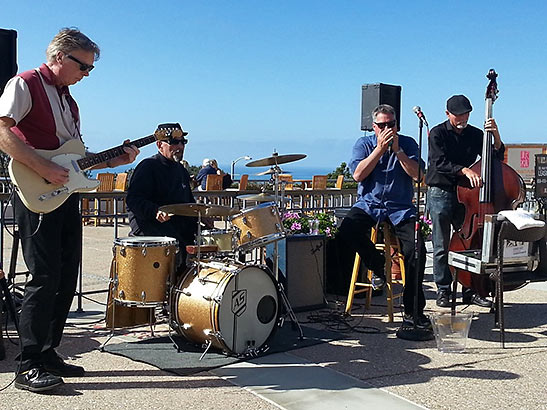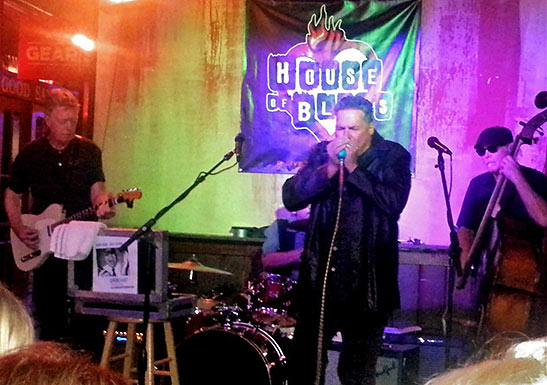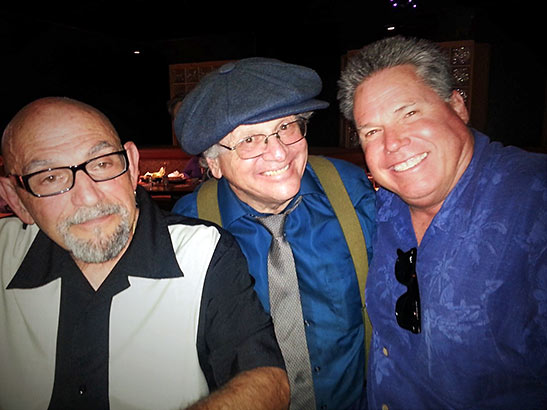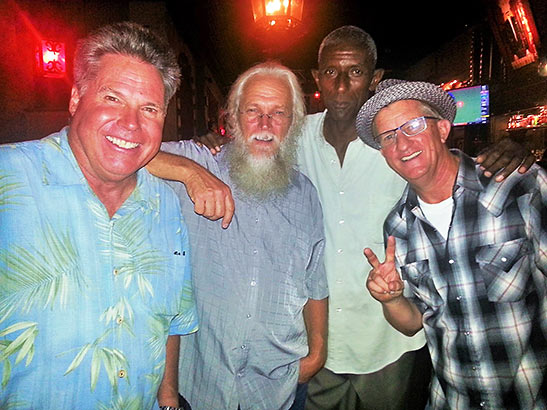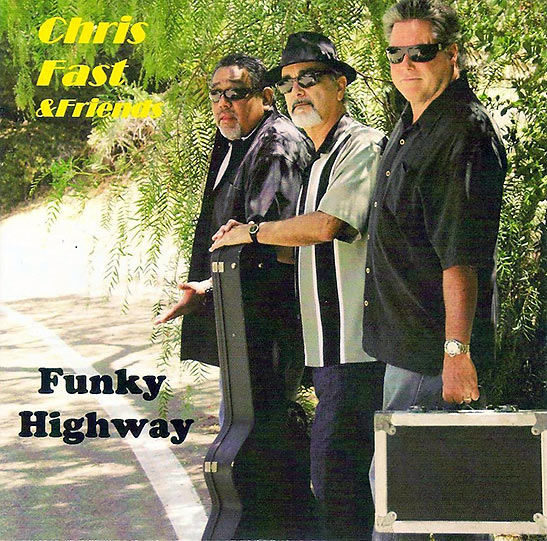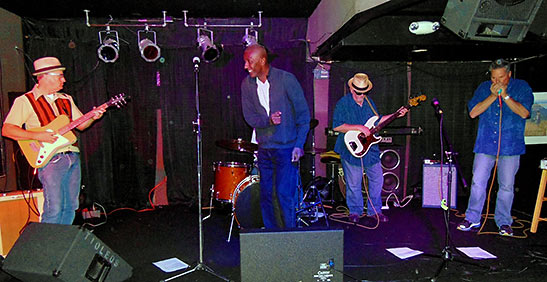 |
 |
|
 |

|
Makin'
Plans…
I've known Chris Fast for too many years to remember but this was my first opportunity to sit down and grill him about his road and making music. It's definitely been worth the wait, and our conversation started with the here and now. "Well, currently," Chris says. "I'm playing real Chicago Blues, that's what I'm doing now. Previously with Little Chris and the Night Crawlers band we were kind of a hybrid, we played a lot of blues but we had the R&B influence with the horns, a lot of good arrangements so it was a different kind of thing than the four-piece Chicago sound I'm currently involved in."
Why the change? "I used to play in a band with Bob Newham and Willie Brinlee and the guys that went on to back Bill Clark and growing up in Riverside with Rod (Piazza) we were always playing Chicago blues. I played in his (Piazza's) band for a short period of time, playing guitar and saxophone with Richard Innes and Jerry Smith, Rod and Glenn Ross Campbell was playing the slide guitar. Chicago blues has always been a love of mine, but it just so happened the personnel I got with (the Nightcrawlers) Fred Rivera and Henry Barrio, Dennis Kenmore, Alfredo Ballesteros, Tommy Bray and Bud Dehl. We had horns and a pretty big sound, it was kind of eclectic, I would say. It was a fun band to play with." You've recently begun playing a lot more with a few folks around Southern California. "I've been trying to get something going in the local area," Fast says. "And I started going down to these jam sessions in San Diego. Chet Cannon's jam and I met Al Schneider down there and Mike Halls I knew from Fallbrook and Don Skelton as a bass player I had worked with before. So we got together and it's a lot of fun for me because the emphasis is on the harmonica and I enjoy it an awful lot. I'm back doing what I started doing." * * * * * * * * * * * * * * * "My goal is to be out playing,
that's really my goal." * * * * * * * * * * * * * * * I first saw Little Chris and the Nightcrawlers about 20 years ago, out in the vineyards around Temecula. "In those days," Chris grins. "We had the Temecula area to ourselves. We played everywhere we wanted… we were playing at Pechanga all the time. We opened shows for B.B. King and the big blues shows they had out there."
Let's talk about the current band and the music you play. "Right now, we're playing a lot of Little Walter material just because it's challenging. And today, nobody around the San Diego area seems to be playing it. When I was younger, everybody was playing Little Walter stuff and it doesn't seem to be that way. People my age started playing music in the '60s when the blues invasion rolled through. When I was in high school we heard, I guess it was the Stones playing some blues and then we started investigating and found out about the guys that originated the music. There was a huge wave of people that were blues enthusiasts at that time. Right now that wave is a little bitty ripple and everybody's getting older, we're getting older, it's not a super popular thing, but I'm going to keep doing it as long as I can." Social media has changed some of that… "It's all over YouTube." Chris agrees. "Back in the day when I was starting, I had to borrow records. Rod (Piazza) gave me my first Little Walter record and said, 'Hey, Listen to this!' And I listened to it and it was weird to me, because it was a whole different style of playing. Of course, Rod was totally off into it and then I started learning it." Your road has taken multiple directions in and out of music; how did your family impact your decisions? "Yeah, I taught school, but my father gave me a harmonica when I was a young boy. I was a little kid and I'd walk around playing this silly harmonica so I was always oriented toward the harmonica. In Junior High school I think the folk music thing was going pretty good and some of my friends decided to put together a little band and I was going to play the harmonica, we had a couple of folk guitars and we played at a talent assembly and that's where it kind of started. I got into some rock bands early on, but we'd play some blues tunes as well and it just sort of evolved from there. Somewhere early on, I remember we had some jam sessions in the summertime and Rod Piazza was involved in those and there was a core group of musicians that would meet every week and I would go down there and play. I started hearing what he was doing and we developed a friendship and as I got older I was playing in blues bands around town. He would pick me up at my house and take me into L.A. where he was playing and all these other guys were playing in these black clubs. I would go with him and he would have his pizza under the front seat for his meal." (laughing) "Saving money!" (laughing) "But it was a great education for me. Later on because I knew all the harmonica songs, he needed a guitar player and I could play some guitar, I never considered myself a very good guitar player… and I proved it every night. I could play okay, just enough to back him. The real soloist was Glenn Ross Campbell who played slide. He was in the Misunderstood and other bands and he was a virtuoso kind of player. And Richard Innes played drums and Jerry Smith played bass and Rod was blowin' harp. So I learned a lot, night after night sitting there behind Rod." Who were some of the people you saw and played with in those early days? "We backed up Big Joe Turner and Pee Wee Crayton was playing with us at one time. We opened shows for John Lee Hooker and later on I was able to work with Percy Mayfield and Big Mama Thornton." Talk a little about Percy Mayfield? "He was just a real sweet guy. Talk about a songwriter, he was the best. Nobody wrote a song like Percy Mayfield. I don't think anybody was better. Nobody! We were on stage one time and the lights went off and he said to me, 'Do they want me off?' Because he was kind of insecure, like a lot of musicians are and of course he had had that accident and stuff. I said, 'don't worry about it man, you're good. You are good!'" (laughing)
Growing up near and getting to know Rod Piazza was a very fortunate happenstance in your musical direction, was it not? "Yeah, I was lucky he lived in town and talk about a great model to have, you know, as an aspiring harmonica player. Rod has always welcomed guest players; if he thinks you're halfway decent he doesn't have a problem getting you up there. In fact, he welcomes it because for one thing, he can take a break. And then when you're done he can say, 'Okay, I'll show you how it's really done.'" (laughing) "It's a good little foil for him. Rod, of course has played with everybody. He played with the real guys. We're just trying to get a good sound and all that stuff, but he was really there with all the guys that were out in L.A." And you are kind of an anomaly actually being from California… "Born in Riverside." Chris nods. "I knew Rod for a long time, we would go fishing and his dad would put together the cheese garlic bait for us. It was a neighborhood thing. It was perfect. If I'm any good at all, it's because of being around Rod and the good harmonica players." Some may notice a few similarities in style and presentation with you and Rod… "I'm not trying to imitate Rod, but I think we are both admirers of Little Walter. If you're a harmonica player who are you gonna' want to listen to? Big Walter, George Smith, all those guys are the tip of the top."
What is it about harp players? Not to frighten you, but most seem to have a very short life span? (laughing) "Little Walter was crazy." Chris laughs. "Rod told me Walter would seek out the worst people he could find, and that's who he would hang with. You've probably known people like that. They just can't resist and that's the people they seek, the lowest common denominator and that's what they enjoy. I don't know, there's a physical quality to the playing, it takes strength to play the harp, it takes a little energy, I think." Outside of the Chicago sound, or blues in general what other music appeals to you? "I listen to a lot of jazz. If I'm listening to music, I'll be listening to jazz. I appreciate that, I imagine if I was a better musician or more educated in music, maybe I would be a jazz musician perhaps, I don't know. I like the sax players like Coltrane and all those guys." It's often said and comparisons have been made with Little Walter's amplified harp sound being very similar to saxophone lines. "Right, to get the instrument to sound bigger, to sound like a saxophone, Walter was playing… of course swing music was big at that time in the early '50s, Louis Jordan was having a lot of hits as an alto player and people would learn his lines and play it in their music. It really had more of a swing to it." Swing music seems to be on the rise in Southern California these days. "There are venues I'm learning that want to have swing dancing so this is a good opportunity." Let's talk a little about you latest CD offering… Funky Highway. "Well Henry Barrio was with the Nightcrawlers and before that he played with Hoyt Axton for years. He's a great guitar player, and really good arranger with really good musical sense. Alfredo Ballesteros, a tenor player was with the Boxing Ghandi's on Atlantic Records, he's a great jazz/rock tenor player. And we were with the Nightcrawlers for all those years, so Henry and I just for something to do; Henry would come over and record at my house. I have a little setup and I would write a song maybe and he and I would arrange it and put our basic tracks on it and Henry can play all these different styles. Then Alfredo would come over and put a horn part on it or we would get Tommy Bray, a trumpet player to come over and do something and over time we put together a few songs."
Can you talk a little about your writing style? "I would say I don't have a style." (laughing) "I wish I was better at it. But I do enjoy coming up with something original. I strive to write a song that in some way isn't full of clichés… I'm not trying to be different, but I've noticed some people have a tendency to grab a line from one song and a line from another song and you put it together and you've got something brand new. And maybe you do, because that's what we all do anyway. We steal and borrow everything that we do, whether it's the notes we play, how we play them, the lines we put in our songs… but I enjoy writing. You cover Percy Mayfield's 'You Lied to Me.' "I was listening to my IPod and that one came up. I thought, 'Oh, man that's a good one.' So, I recorded it, in fact I played guitar on that particular song, for what it's worth. You can't miss with a Percy Mayfield song." How long did you get to work with Percy? "I played a few gigs with him in San Bernardino, at a place called the Kola Shanah. I wasn't like great buddies with him or anything. You know all those guys were out in L.A. at the time, Joe Turner and everybody." Any new directions, what's next for Chris Fast? "I don't have a plan. I'm taking it one week at a time. If you have a plan, that means you have a goal… and my goal is to be out playing, that's really my goal. So I'm succeeding at that although, I need more gigs with this band that I have right now. That's all I want, I just want to be out playing." The current lineup for the Chris Fast Band is relatively new? "We've only been together about 4 months and currently Al Schneider is playing drums. Of course, he played with the Everly Brothers. He toured a long time with them. He's been at it for quite awhile. In fact, he told me the drum kit he's playing now, he bought in '58. So, I don't know what that means… he's not a youngster. But, man the guy can play, he's great. He's on it… powerful. He's a good connection for the San Diego area, he knows everybody. He's always out there. Our guitar player is Mike Halls. 'English' Mike lives in Temecula and I met him down at one of the jams in Fallbrook and he plays in a traditional style which works really well. And then Don Skelton plays upright bass. He's kind of a jazzer and he really knows what he's doing. He's really proficient. He knows his way around a bass and can read… and he's a really good guy. So everybody gets along really well." Another project I occasionally see you play with is the Little Kings. "At Chet Cannon's jam I met John Flynn and he heard me play. He always liked to have another instrument as a soloist. So he called me up and started using me on some gigs and that's been for almost a year now. It's been a lot of fun.
"It's been a goal of mine to establish myself as a harp player in the San Diego area. I think I'm doing okay at it, I'm having fun anyway." Chris flashes a big grin. "I do have a goal, I'm just going to play on out. I'm just going to keep playing until I can't play anymore. That's what I'm gonna' do." Sounds like a plan to me. Related Articles: |
|
|
This site is designed and maintained by WYNK Marketing. Send all technical issues to: support@wynkmarketing.com

|






